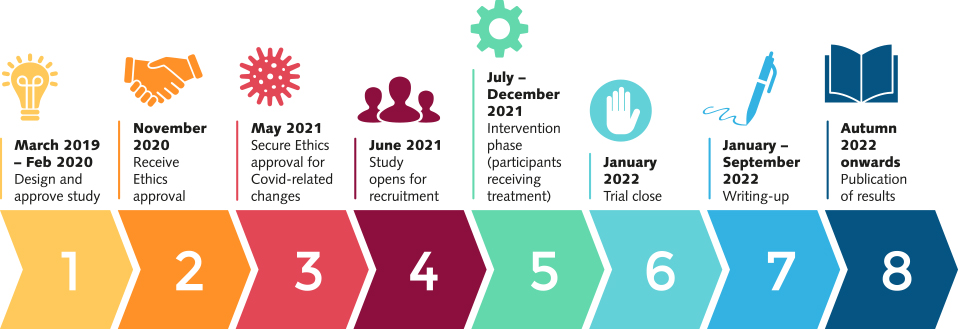


Between March 2019 and February 2020 the study was being designed. This was an iterative process of reading, discussing with academic supervisors and the Thesis Advisory Panel, adjusting, reading more, discussing more… and so on. The intention was always to design a pragmatic trial – one in which the treatments under investigation would be delivered just as they are in the real world, rather than under more laboratory-like conditions. And there was never any discussion about using any kind of placebo: for one thing, it doesn’t work in a pragmatic trial; and for another it’s not a good comparator for acupuncture* and clearly no placebo could be substituted for nutritional therapy. So from the outset, this was always going to be a pragmatic trial. In being pragmatic in nature, it follows in the footsteps of Professor Hugh MacPherson, the trialblazer (that was not a typo) whose trials of acupuncture and other complementary therapies carried out between 1990-2020 helped to create new credibility for complementary therapies.


In March 2020 the study was submitted for HRA Research Ethics Committee (REC) approval. It had first been given approval by the Health Sciences Research Governance Committee at the University of York, in what could be described as a “first pass” ethics application. This was designed to iron out major glitches, of which thankfully there were none – although the HSRGC did ask for some minor changes. Following this, the study was sent to the University’s Contracts & Sponsorship department for sponsor sign-off, and subsequently submitted via the Integrated Research Application System (IRAS) to the first Health Research Authority (HRA) Research Ethics Committee with available time. This turned out to be the London (Surrey) REC; the committee gave the study very thorough scrutiny and asked many questions (see separate blog post here). After a few back-and-forth resubmissions, Ethics approval was given on 3rd November 2020.


Although the study gained Ethics approval and could have started in November 2020, unfortunately by that time Christmas was imminent. It wouldn’t have been a good idea to start the trial then, because the festive season would have imposed a break in treatments – so it was decided to wait until January. But then in early January, the UK went into a third lockdown. This was dismaying for all concerned with Santé-AF, but nothing was to be done. It was decided to make some small changes to the study to take account of Covid-19. These small changes included the collection of a small amount of extra data from participants regarding their feelings about taking part in a trial during a pandemic; and also a change in the eligibility criteria so that participants who were clinically vulnerable, or living/bubbled with anyone who was vulnerable, would not be able to take part. There were also some changes made to trial processes, including moving online for all nutritional therapy appointments, and all study assessments. Some of these amendments were classed by the HRA as “substantial”, and so the study was resubmitted to the London (Surrey) REC in April 2021. Some questions were raised, and answered, and the substantial amendment was given approval on 7 May 2021. This means the study is now effectively “Covid-proofed” – i.e., equipped to make some findings whether or not Covid is still rampant during the trial phase.


All being well, the study should open for recruitment in June 2021. All GPs in the York area who express an interest in taking part will check their records for patients with AF who meet basic eligibility criteria (aged 45-70; diagnosed with AF between six and 60 months previously; and having been offered appropriate stroke prevention measures). Patients who meet those criteria will have their records screened by their GP and (if there are no other reasons why the patient should not take part) the practice will send a “permission to approach” pack to the patient, giving basic information and asking whether the patient is interested in participating. Patients who are interested will receive a full Participant Information Sheet and a consent form, and if they sign and return this, we will contact them to do a final screening and a baseline assessment. In the baseline assessment, which we’re carrying out online to minimise the risk from Covid-19, participants will complete a questionnaire and take some measurements, then take away a 7-day symptom diary to complete. Participants who have told us they’re willing to be interviewed will have their interview at the baseline assessment too. After the baseline assessment, participants will be enrolled in the study and randomly allocated to a group (A: acupuncture + usual care, B: nutritional therapy + usual care or C: usual care alone).


In the intervention phase, which should run between July and December 2021, all participants will be receiving their treatments (or simply their usual care, if they are in Group C). Participants in the acupuncture group will receive up to eight acupuncture treatments ideally once a week; participants in the nutritional therapy group will receive up to three nutrition consultations at about monthly intervals; and participants in the usual care group will simply continue with their usual care without receiving any extra treatment. After the baseline assessment at the start of the study, we will carry out an end-of-treatment follow-up, similar to the baseline assessment, including the interview for those participants who are willing to be interviewed. Participants who have stayed in the study will receive a £10 retail voucher as a thank-you.


The trial is loosely planned to close in January 2022 – that’s the date by which all participants should have received their final treatment. In practice, that may be sooner or later than planned. One reason why the trial might close later, for instance, is if Covid-19 cases and the R-rate in York rise beyond a certain level over a 7-day average each week: the Trial Steering Committee is tracking this data and will pause the acupuncture group of the study if that level is exceeded. That’s because the acupuncture group is the only group receiving any face-to-face treatments, which carries an increased risk of Covid transmission. If the pause is only temporary – say a few weeks – the acupuncture arm may resume. Alternatively, if the pause is longer, the Trial Steering Committee may decide to close the acupuncture arm of the trial altogether. For the trial’s sake as well as all the obvious reasons, we are hoping that Covid-19 in York remains stable – but participant safety always comes first in medical research, and we do have plans to keep participants safe if the numbers rise.


Writing up the trial’s results, which should happen between January and September 2022, involves carrying out extensive data analysis on the information gathered from the practitioners and participants during the trial months. Some of this data will be statistical analysis, where we will apply statistical methods such as correlation tests and analysis of variance tests; and some of the data will be qualitatively analysed using a method called reflexive thematic analysis. Using both quantitative and qualitative data in the study allows us to find out not just whether a given aspect of the trial is feasible, but also to understand why it is feasible (or not). This gives us a good way of understanding whether or not a future trial is feasible, and if not, what recommendations can be made for changes to the future trial.


Publication of the trial’s results should happen in the autumn of 2022 and onwards. That means we’ll publish the results in various ways. Very importantly, we’ll send every participant a summary of the results. We’ll publish in peer-reviewed journals such as the Journal of Pilot and Feasibility Studies, and we’ll also publish in journals read by acupuncturists and nutritional therapists. We’ll do face-to-face presentations at conferences, and if the results are interesting for people with AF we’ll aim to do some presentations at patient support groups and via support charities as well. We’ll put the results on this website, too.

Thank you for sharing our journey. If you’re interested in updates on Santé-AF, please bookmark any page on this site, from which you’ll be able to access our Latest News posts. And if you’d like to get in touch, please use our Contact form.
* while so-called “sham” acupuncture can be given in theory, in practice all forms of sham acupuncture have been shown to have some therapeutic effect, meaning they are not a good comparator for real, or “verum” acupuncture. If you would like to know more about this, there is a brief, clear discussion in this 1995 paper by Charles Vincent and George Lewith.
